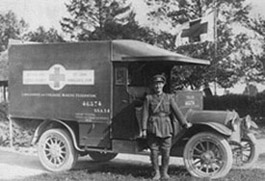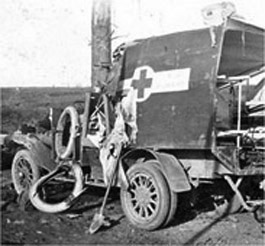

FAU China Convoy Reunion Group
The FAU In the First World War
The FAU was first formed in 1914 by a group of young Quakers and their friends, and consisted overwhelmingly of men. Around 1,300 individuals joined the Unit, roughly half of whom were deployed in France and Belgium providing ambulance, hospital and public health services on the Western Front, and half of whom were engaged in providing relief services in Britain.
In the jingoistic atmosphere of the First World War (WW1) those refusing to fight were branded as cowards and traitors and were harshly treated, even though many enlisted in the Non Combatant Corps. Most harshly treated were those Conscientious Objectors (COs) who were termed ‘absolutes’ and felt that their consciences would not allow them to participate in any way in the processes of war. Having been imprisoned in Richmond Castle, sixteen of these COs were sent to France and ordered into combat; when they refused, they were court-martialled and sentenced to death, although this was commuted at the eleventh hour to 10 years’ hard labour, which they served in full.
Accusations of lack of bravery were not justified by their actions; in the course of the conflict the FAU transported over 250,000 casualties back from the Front in ambulances and over 500,000 via hospital trains. It should also be noted that their work began two years before conscription was introduced in 1916 and continued with refugee relief work in Austria, Germany and Poland and further ambulance work in the Russian Civil war up until 1923 – four years after most soldiers had been demobilised.
After the war John Leyland, like his comrades, was still treated with suspicion and hostility by his neighbours in Wensleydale. They were very much surprised to learn at his funeral in 1942 that he had been awarded the Croix de Guerre.
In total some 93 WW1 Unit members received gallantry awards – mainly from the French – as British political opinion had debarred them from receiving British military gallantry awards.

John Leyland with his FAU ambulance,

and after being hit by a shell

 FAU China Convoy Reunion Group
FAU China Convoy Reunion Group 
 FAU China Convoy Reunion Group
FAU China Convoy Reunion Group 
